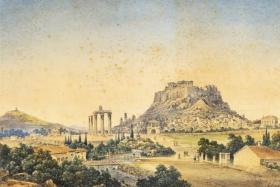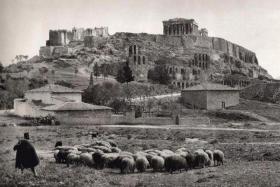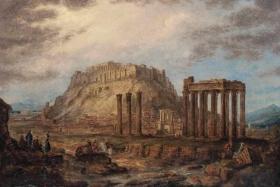New Greek Capital
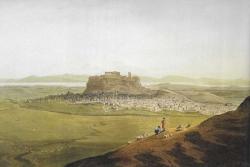 On Thursday 18th September 1834, Athens was declared the capital of the young Greek state. It was selected as the capital from cities including Argos, Corinth, Megara, Piraeus, as well as the original capital of Nafplio. The reasons that led Athens to finally being chosen have to do with its glorious history as the cradle of ancient Greek culture. The decision was probably influenced by the the recently appointed King of Greece, Othon, as well as his father, King Ludwig of Bavaria, who was a well-known archaeologist and lover of ancient Greece. At the time, Athens was a big village of 7,000 people living in 400 dwellings, and still hadn't recovered from the recent local battles of the Greek Revolution in 1826/27. At the same time Patras had a population of 15,000 inhabitants, while Thessaloniki had 60,000.
On Thursday 18th September 1834, Athens was declared the capital of the young Greek state. It was selected as the capital from cities including Argos, Corinth, Megara, Piraeus, as well as the original capital of Nafplio. The reasons that led Athens to finally being chosen have to do with its glorious history as the cradle of ancient Greek culture. The decision was probably influenced by the the recently appointed King of Greece, Othon, as well as his father, King Ludwig of Bavaria, who was a well-known archaeologist and lover of ancient Greece. At the time, Athens was a big village of 7,000 people living in 400 dwellings, and still hadn't recovered from the recent local battles of the Greek Revolution in 1826/27. At the same time Patras had a population of 15,000 inhabitants, while Thessaloniki had 60,000.
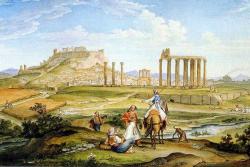 The original capital of Independent Greece was Nafplio, which the Greek revolutionaries had agreed to select at a joint Assembly in Trizina/Damalas in 1827. The newly appointed King Othon (Otto) resided in Nafplio from 1833 to 1834 before deciding to move his capital to Athens. Greek and Bavarian architects were commissioned to rebuild the destroyed village of Athens, with a strict order not to touch the existing archeological sites. In the following decades, Athens was rebuilt according to the standards of a modern city. The founding of the University of Athens in 1837 helped transform Athens from a village-to-a-town-to-a-city with European standards. Athens, named after the goddess Athena, is now the largest city in Greece and one of the world's oldest cities, with its history spanning over 3,400 years.
The original capital of Independent Greece was Nafplio, which the Greek revolutionaries had agreed to select at a joint Assembly in Trizina/Damalas in 1827. The newly appointed King Othon (Otto) resided in Nafplio from 1833 to 1834 before deciding to move his capital to Athens. Greek and Bavarian architects were commissioned to rebuild the destroyed village of Athens, with a strict order not to touch the existing archeological sites. In the following decades, Athens was rebuilt according to the standards of a modern city. The founding of the University of Athens in 1837 helped transform Athens from a village-to-a-town-to-a-city with European standards. Athens, named after the goddess Athena, is now the largest city in Greece and one of the world's oldest cities, with its history spanning over 3,400 years.
In the years to come, Athens became the pole attraction for many Greeks, who arrived at the capital from all parts of the country. In 1896, Athens and Greece hosted the Games of the I Olympiad, the first modern Olympics. By that time, the capital had radically changed, and the country had a new king. Athens, as a city had expanded and now had 140,000 residents, with great buildings and important archeological sites, becoming the commercial, cultural and intellectual centre of the developing Kingdom of Greece.
